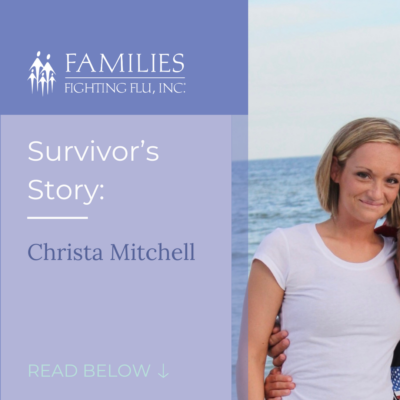
- Flu Vaccine Information
- Personal Stories
Survivor’s Story: Christa Mitchell

Christa Mitchell was a healthy, vibrant, dedicated wife and mother who was actively engaged in her full-time job and her son’s school and sports activities when she found herself in an unexpected health crisis—the holiday season had brought flu into her family.
As her symptoms escalated, she became acutely aware of the gravity of her condition and went to the hospital but was initially sent home. Undeterred, she listened to her body as her symptoms worsened, ultimately saving her own life by returning 48 hours later for the care she desperately needed.
Below, we shed light on Christa’s story and the necessary role of early detection and immediate intervention. This isn’t just a story of overcoming flu complications, it’s a rallying call for everyone to be attuned to their bodies, recognize warning signs, and act swiftly when health is at stake.
Worsening Flu Symptoms
Just two days after returning home Christa was so sick that her husband had to carry her to the car and take her to the emergency room at their local hospital where she was eventually diagnosed with H1N1, pneumonia, and acute respiratory distress syndrome (ARDS). Enduring a 48-day hospitalization, she faced the challenges of ventilator support, blood transfusions, and the devastating consequences of septic shock—losing fingers, fingertips, and toes. Her life, now marred by ongoing medical complications and PTSD, stands as a testament to the gravity of flu-related illnesses.
Notably, Christa had forgotten the flu vaccine that year, an experience that has transformed her into an advocate for annual vaccination. Her impassioned plea underscores the importance of prioritizing flu vaccines but even if you’ve missed your flu vaccine knowing the symptoms to look out for so that you can test and seek treatment for the flu can make a world of difference.
Test and Treat for Flu to Prevent Complications
Christa’s battle with the flu reminds us that the power to prevent severe complications often lies in our hands. The flu doesn’t discriminate between healthy individuals and those at higher risk with pre-existing conditions or compromised immune systems. Everyone can get the flu so it’s important to seek testing at the onset of symptoms so that you can pursue prompt treatment with antiviral drugs, if necessary. Testing is key to knowing whether you have flu, COVID-19, or another respiratory virus. It also allows for proper treatment— which can be life-saving.
If you test positive for the flu, you can discuss potential flu treatments such as antiviral drugs. Antiviral treatment is expected to lessen fever and symptoms and shorten the time you are sick. They also may reduce the risk of complications such as ear infections in children, respiratory complications requiring antibiotics, and hospitalization in adults.
When Should You Get Tested for Flu?
Knowing how to spot flu symptoms is the first step to knowing whether you should get tested for the flu. According to the U.S. Centers for Disease Control and Prevention (CDC), flu symptoms can range from:
- Fever
- Cough
- Sore throat
- Runny or stuffy nose
- Body aches
- Headache
- Chills
- Fatigue
Some people may have vomiting and diarrhea, though this is more common in children. You may even experience respiratory symptoms without a fever. These symptoms can vary widely from person to person so the best line of defense (after being vaccinated), is to seek medical care and get tested if you are experiencing these common flu symptoms.
As we continue into the 2023-2024 flu season, let Christa’s journey inspire a proactive mindset towards health. Together, let’s champion the importance of recognizing symptoms early, seeking testing, and securing timely treatment.
Learn More About Families Fighting Flu
Founded in 2004, Families Fighting Flu (FFF) is a national, nonprofit, 501(c)(3) advocacy organization dedicated to protecting children, families, and communities against the flu through education about the seriousness of influenza. Our organization includes families whose loved ones have suffered serious medical complications or died from influenza, as well as other advocates and healthcare professionals committed to flu education and prevention.
In honor of our loved ones, we work to increase awareness about the seriousness of the disease and to reduce the number of hospitalizations and deaths caused by the flu each year by increasing vaccination rates for everyone six months and older. Learn more about our mission and resources here so that you can empower your family to stay healthy this flu season.


